SpOILed brat: Is Baku destroying its heritage?
Ahead of the inaugural 2015 European Games in Azerbaijan, Jack Palfrey goes in search of an authentic slice of Baku in a city that fiercely divides opinion.
The sky grumbles and whips at the grey clouds above; it’s an unworthy backdrop for the twisting glass superstructure that stretches up towards it.
I cock my neck, straining to take in the full scale of the Flame Tower, one of three identical skyscrapers that have dominated the Baku cityscape since their construction in 2012.
While other passersby hold the same pose (neck bent double, mouth hanging ajar), I find myself surveying a more unassuming structure – one with smooth limestone walls, a curved dome ceiling and two spiking turrets. It’s almost insignificant in the shadow of the surrounding skyscrapers.
My guide Anar approaches me. He’s an Azerbaijan native who resembles a miniature giant, with a ruffle of black hair and a tendency to slap his feet on the ground as he walks.
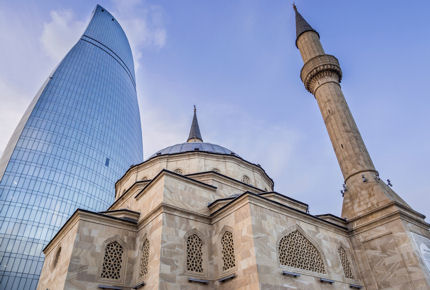 The Turkish Mosque stands in the Flame Towers' shadow
The Turkish Mosque stands in the Flame Towers' shadowiStock / Thinkstock
“This is the Mosque of the Martyrs,” he says, pre-emptively answering my question. “It was once one of the busiest mosques in the whole city.”
He sighs.
“It was closed ‘for repairs’ six years ago,” he adds, making the quote signs with his swollen fingers. “It still hasn’t reopened.”
I imagine the scene here a decade ago: the call to prayer ringing out as families hurry to start their morning worship; market stalls lining the roads selling baked snacks, shiny beads and colourful silks.
Their modern day counterparts are business types in sharp suits and skinny ties. They sip mochaccinos and smirk as they slip into their sports cars, speeding off to their next meeting.
“Sometimes I find it funny how money is spent in this city,” says Anar, turning his back on both buildings.
His disillusionment towards the capital city is not uncommon. Azerbaijan’s history has been a fractured one, tumbling from one ruler to another. Since independence in 1991, Baku has seemingly struggled to carve itself an identity, imperatively clinging to the one constant – oil.
When Professor Jackson of Columbia University visited in 1911 he wrote: “Oil is in the air one breathes, in one's nostrils, in one's eyes, in the water of the morning bath, in one's starched linen – everywhere. This is the impression one carries away from Baku.”
100 years on, oil is confined to a huge network of offshore rigs, but visitors can still get a whiff of black gold emanating from the huge architectural spectacles around the city. For better or worse, Baku has been stained black.
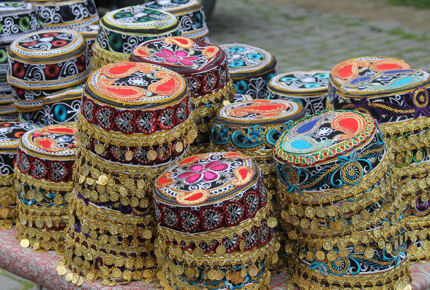 Colourful taqiyahs (prayer hats) line the stalls in the Old City
Colourful taqiyahs (prayer hats) line the stalls in the Old CityJack Palfrey
Keen to cleanse my nose of this metaphorical stench, I find solace weaving through the alleyways of Baku’s walled Old City. The cobbles beneath my feet compliment the traditional teahouses, weathered carpet stores and unmarked mosques into which a steady trickle of locals silently funnel.
Following the scent of sweet cinnamon, I turn into a side street and find myself standing face-to-face with my own reflection in a glass-fronted restaurant. A conversation from a few days previous manifests itself in my mind.
“To me Baku is so…” Tania grabs with her thumb and forefinger, attempting to pluck the correct word from the air. “It’s so… synthetic,” she finally settles on with a gratified nod.
Though her family were originally from Russia, Tania was born in Baku and she moved to the interior of Azerbaijan to open a farm-cum-guesthouse with her husband.
“Sometimes when I drive around the city, I look around and think, ‘Oh my God, where am I? What is this building here? Last time I was here, this was a park, not a hotel’,” she adds.
Even the protected Old City is not exempt from this rapid expansion. After being granted UNESCO World Heritage status in 2000, the area found itself on UNESCO’s list of sites in danger just three years later, due in part to “illegal demolition and uncontrolled development”.
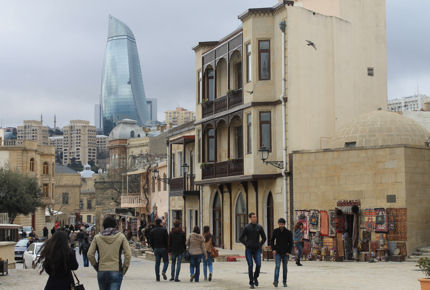 Modern structures clash with Baku's Old City architecture
Modern structures clash with Baku's Old City architecture Jack Palfrey
While attempts to maintain the Old City have increased since, the glass structure before me questions whether Baku’s bid for modernisation outweighs its desire to protect its heritage.
As night draws in I head to the promenade, a 3km (1.9-mile) stretch of parkland that skirts along the edge of the Caspian Sea. The city has felt deserted all day and I’m surprised by the number of people chattering excitedly as they pass us on the way to the seafront. Many are adorned with colourful bell-rimmed taqiyahs (prayer hats) that jingle in the sea breeze.
Anar explains that today is the beginning of Novruz, the Azeri festival of spring. Under Soviet rule, the festival was celebrated unofficially and even prohibited in some areas, but today it’s an important part of Azeri life.
During the five-day public holiday, local people gather with their families to eat, plant trees and – most intriguingly – jump over bonfires. The latter is said to burn away any lingering bad omens from the previous year.
As we walk to the promenade’s main square, where the biggest festivities will take place, we’re joined by Samir, a smartly dressed gentleman in his mid-20s and a recent graduate of the Baku 2015 European Games Excellence Programme, a project that offers practical work experience at the Games to Azerbaijan’s recent university alumni.
We settle on a grassy slope that overlooks the throng of people in the main square. In the centre of the crowd I can see a large bonfire and a young girl, skinny as a rake, limbering up to make the first jump of the evening.
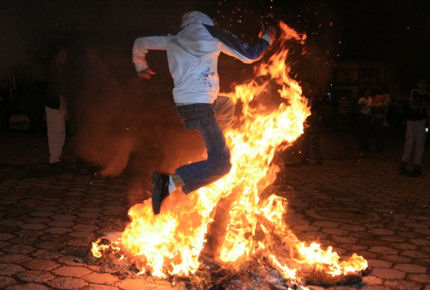 Participants jump through the flames three times for good luck
Participants jump through the flames three times for good luckCreative Commons / Carlos Adampol Galindo
With Anar transfixed in anticipation, I take the opportunity to ask Samir for his thoughts on the city, half-shouting over the melodic plucking of tars (Azeri lutes) nearby.
“I love Baku,” he barks back. “It’s a very exciting time for the city.”
Does he feel like the rapid modernisation is diluting the city’s cultural heritage?
He laughs loudly over the music.
“This is our heritage,” he says gesturing with both arms to the festivities unfolding before us.
He moves in closer.
“Buildings are just buildings. Our heritage is the people here. Things are good, we are moving forward as a nation and good things are happening. It doesn’t matter how it looks from the outside,” he adds, before leaning back.
Perhaps when you’ve had a history as turbulent as Baku’s, sometimes it’s more important to spend time looking forward than gazing back.
The young girl finishes stretching, takes a deep breath to settle her nerves and leaps elegantly across the flames. The crowd roars in approval, and around her, all of the past’s problems burn away.
Liked this? Then have a read of these:
Discovering the spirit of Istanbul in Berlin
Has Nicaragua been sold down the river?
On the radar: 12 places to go in 2015
Do you have any Feedback about this page?
© 2026 Columbus Travel Media Ltd. All rights reserved. No part of this site may be reproduced without our written permission, click here for information on Columbus Content Solutions.






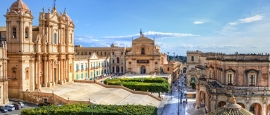


 You know where
You know where